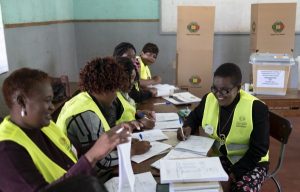
Officials are seen preparing for the 30 July general elections at a polling station in Mbare, Harare. Photo: AFP / Marco Longari
President Emmerson Mnangagwa, Mugabe’s former ally in the ruling ZANU-PF party, faces opposition leader Nelson Chamisa of the MDC (Movement for Democratic Change) in a historic vote for the southern African nation.
Mugabe (94), who was ousted by the military in November, made a surprise intervention on the eve of the elections, calling for voters to throw ZANU-PF out of office.
Mnangagwa (75), who promises a fresh start for the country despite being from the ZANU-PF elite, is the front-runner with the advantage of covert military support, a loyal state media and a ruling party that controls government resources.
But Chamisa (40), who has performed strongly on the campaign trail, hopes to tap into a young population that could vote for change.
The election is Zimbabwe’s first without Mugabe, who led ZANU-PF to power in a vote when the country became independent from British colonial rule in 1980 — and ruled for 37 years.
Elections under Mugabe were marred by fraud and often deadly violence, and this year’s campaign has been dogged by accusations that the result will be rigged.
The MDC has raised repeated allegations of a flawed electoral roll, ballot paper malpractice, voter intimidation, bias in the Zimbabwe Electoral Commission (ZEC) and free food handed out by the ruling party.
But campaigning has been relatively unrestricted and peaceful.
“After years of stasis, the events of November 2017 gave Zimbabwe the chance to dream again,” Mnangagwa said Sunday in an address on state radio.
“As we have always said, the elections will be free, non-violent and credible.”
A recent Afrobarometer survey of 2,400 people put Mnangagwa on 40 percent and Chamisa on 37 percent, with 20 percent undecided.
Mnangagwa, who is accused of involvement in election violence and fraud under Mugabe, invited international observers — including the previously-banned European Union team — to the poll.
The EU team will deliver a preliminary report later in the week.
AFP
Post published in: Featured

